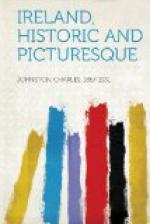The lions of the hill
are gone,
And I am left alone,
alone;
Dig the grave both wide
and deep,
For I am sick and fain
would sleep!
The falcons of the wood
are flown,
And I am left alone,
alone;
Dig the grave both deep
and wide,
And let us slumber side
by side.
Lay their spears and
bucklers bright
By the warriors’
sides aright;
Many a day the three
before me
On their linked bucklers
bore me.
Dig the grave both wide
and deep,
Sick I am and fain would
sleep.
Dig the grave both deep
and wide,
And let us slumber side
by side.
VI.
Cuculain the hero.
B.C. 50—A.D. 50.
The treacherous death of Naisi and his brothers Ardan and Alny, and her own bereavement and misery, were not the end of the doom pronounced at her birth for Deirdre, but rather the beginning. Yet the burden of the evils that followed fell on Concobar and his lands and his warriors.
For Fergus, son of Roeg, former king over Emain, who had stayed behind his charges feasting and banqueting, came presently to Emain, fearing nothing and thinking no evil, but still warm with the reconciliation that he had accomplished; and, coming to Emain of Maca, found the sons of Usnac dead, with the sods still soft on their graves, and his own son also dead, Deirdre in the hands of Concobar, and the plighted word of Fergus and his generous pledge of safety most traitorously and basely broken; broken by Concobar, whom he himself had guarded and set upon the throne.
Fergus changed from gladness to fierce wrath, and his countenance was altered with anger, as he uttered his bitter indignation against Concobar to the warriors and heroes of Emain and the men of Ulad. The warriors were parted in two by his words, swaying to the right and to the left, as tall wheat sways before one who passes through it. For some of them sided with Fergus, saying that he had done great wrong to put Concobar on the throne, and that even now he should cast him down again, for the baseness and treachery of his deed; but others took Concobar’s part, saying that the first betraying was Naisi’s, who stole away Deirdre,—the hostage, as it were, of evil doom, so that he drew the doom upon himself. They further said that Concobar was chief and ruler among them, the strong and masterful leader, able to uphold their cause amongst men. So indeed it befell, for the sedition of Fergus and his fight to avenge his wrong upon Concobar failed, so that he fled defeated to Meave, Queen of Connacht, at her stronghold amid the lakes whence issues forth the Shannon.
[Illustration: Honeycomb, Giant’s Causeway.]




